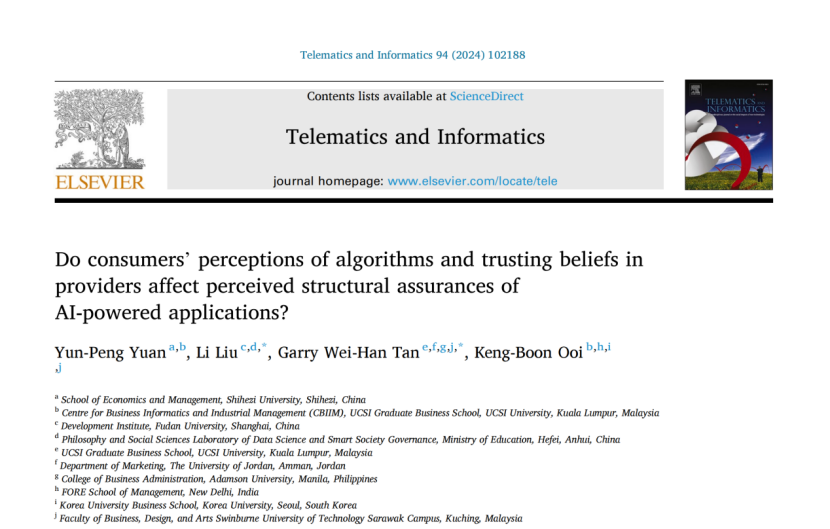作者:Yun-Peng Yuan,Li Liu,Garry Wei-Han Tan,Keng-Boon Ooi 发布时间:2024-10-14 来源:《Telematics and Informatics》+收藏本文

由复旦大学发展研究院副研究员、教育部哲学社会科学实验室——合肥工业大学“数据科学与智慧社会治理”实验室兼职研究员刘丽博士合作完成(共同通讯作者)的论文“Do consumers’ perceptions of algorithms and trusting beliefs in providers affect perceived structural assurances of AI-powered applications?”发表于SSCI一区TOP期刊《Telematics and Informatics》(IF:7.6)。该期刊是一本跨学科期刊,发表有关数字技术对社会、经济、地理、政治和文化影响的创新理论和方法研究。应用领域包括智慧城市、传感器和信息融合、数字社会和数字平台、物联网(IoT)、网络物理技术、隐私、知识管理、分布式工作、应急响应和危害、移动和无线通信、健康信息学、社交媒体的社会心理影响、可持续发展的ICT、区块链、电子商务和电子政务。
该论文探讨了消费者对算法的认知及对服务提供者的信任信念如何促进他们对使用商业人工智能应用程序的结构性保障的感知。本研究采用部分最小二乘-结构方程建模和模糊集定性比较分析(PLS-SEM-fsQCA)的结合方法,通过297份有效问卷,探讨了所研究因素对感知结构性保障的线性和组合效应。PLS-SEM的结果显示,算法认知(如公平性、责任性和透明性)和信任信念(如仁慈、能力和诚信)与感知的结构性保障呈正相关。fsQCA的结果表明,有四种因果条件的配置解决方案可以解释感知的结构性保障,每种解决方案反映了特定类型的消费者,他们在评估商业人工智能的结构性保障时有独特的考虑。本研究通过从线性和复杂性视角引入消费者对算法的认知和信任信念,丰富了消费者行为研究,尤其是在评估商业AI应用的结构性保障方面。
该项目是科技部“一带一路”外国文教专家项目(DL2022132001L)和“复旦—金光”思想库项目(JGSXK2409)的阶段性成果。
Author
Yun-Peng Yuan
School of Economics and Management, Shihezi University
Centre for Business Informatics and Industrial Management (CBIIM), UCSI Graduate Business School
Li Liu*
Development Institute, Fudan University
Philosophy and Social Sciences Laboratory of Data Science and Smart Society Governance, Ministry of Education
Garry Wei-Han Tan*
UCSI Graduate Business School, UCSI University
Department of Marketing, The University of Jordan
College of Business Administration, Adamson University
Faculty of Business, Design, and Arts Swinburne University of Technology, Sarawak Campus
Keng-Boon Ooi
Centre for Business Informatics and Industrial Management (CBIIM), UCSI Graduate Business School, UCSI University
FORE School of Management
Korea University Business School, Korea University
Faculty of Business, Design, and Arts Swinburne University of Technology, Sarawak Campus
Abstract
This study aims to understand how perceptions of algorithms and trusting beliefs in service providers facilitate consumers’ perceived structural assurance of using commercial AI applications. The present study adopts a combined approach of partial least squares-structural equation modeling and fuzzy-set qualitative comparative analysis (PLS-SEM-fsQCA) to understand the linear and combined effects of the studied factors on perceived structural assurance with 297 effective responses. The PLS-SEM findings revealed that algorithmic perceptions (i.e., Fairness, Accountability, and Transparency) and trusting beliefs (i.e., Benevolence, Competence, and Integrity) were positively associated with Perceived Structural Assurance. The fsQCA findings indicate four configural solutions of causal conditions that explain Perceived Structural Assurance, and each solution reflects a particular type of consumers who have unique considerations when assessing commercial AI’s structural assurance. This study adds to consumer behavior studies by introducing consumers’ perceptions of algorithms and trusting beliefs in evaluating their structural assurances in commercial AI applications from linear and complexity perspectives.
Keywords
Algorithmic perceptions,Trusting beliefs,
Perceived structural assurance,PLS-SEM,
fsQCA,Consumer behaviour
论文下载链接